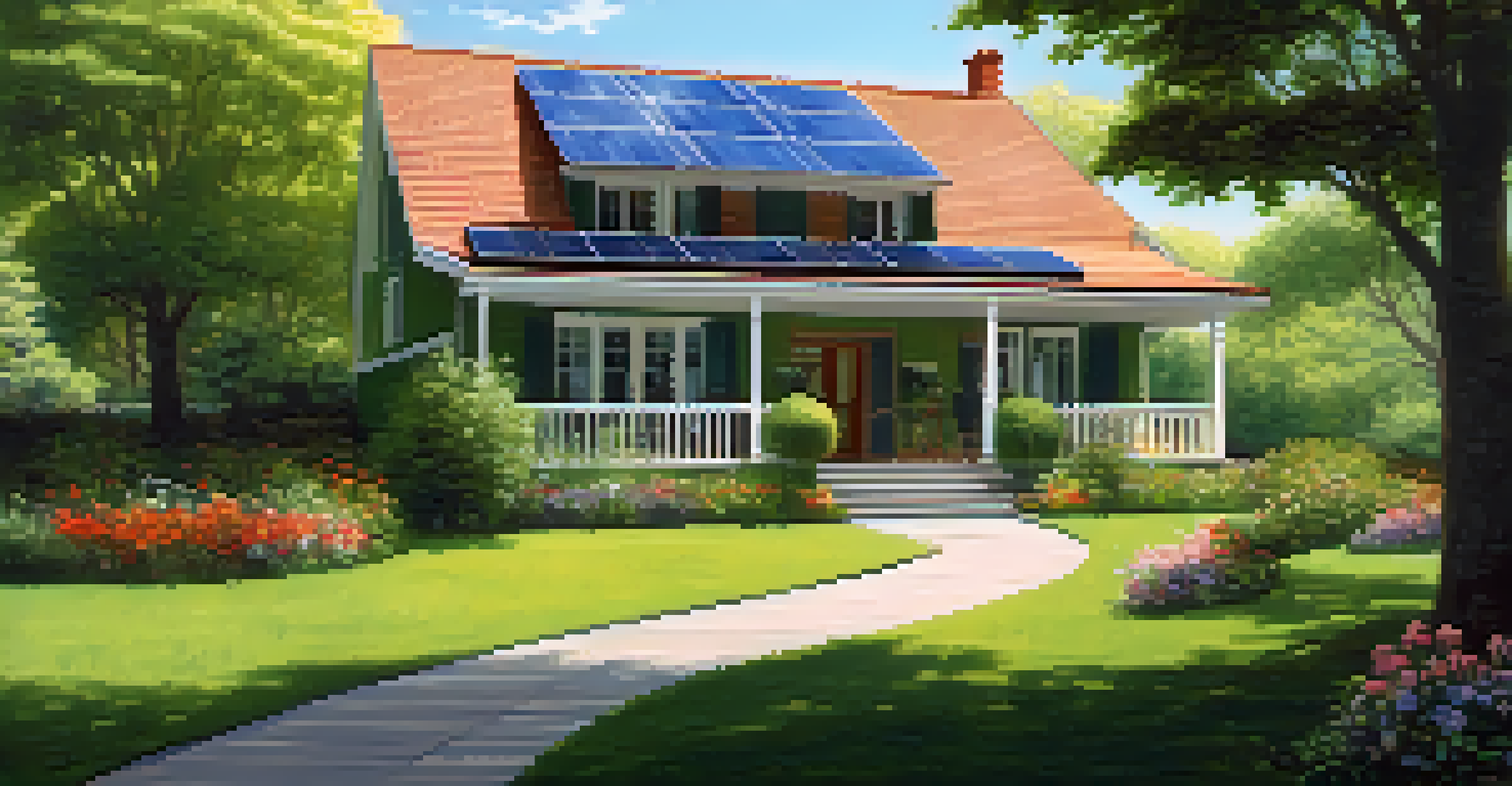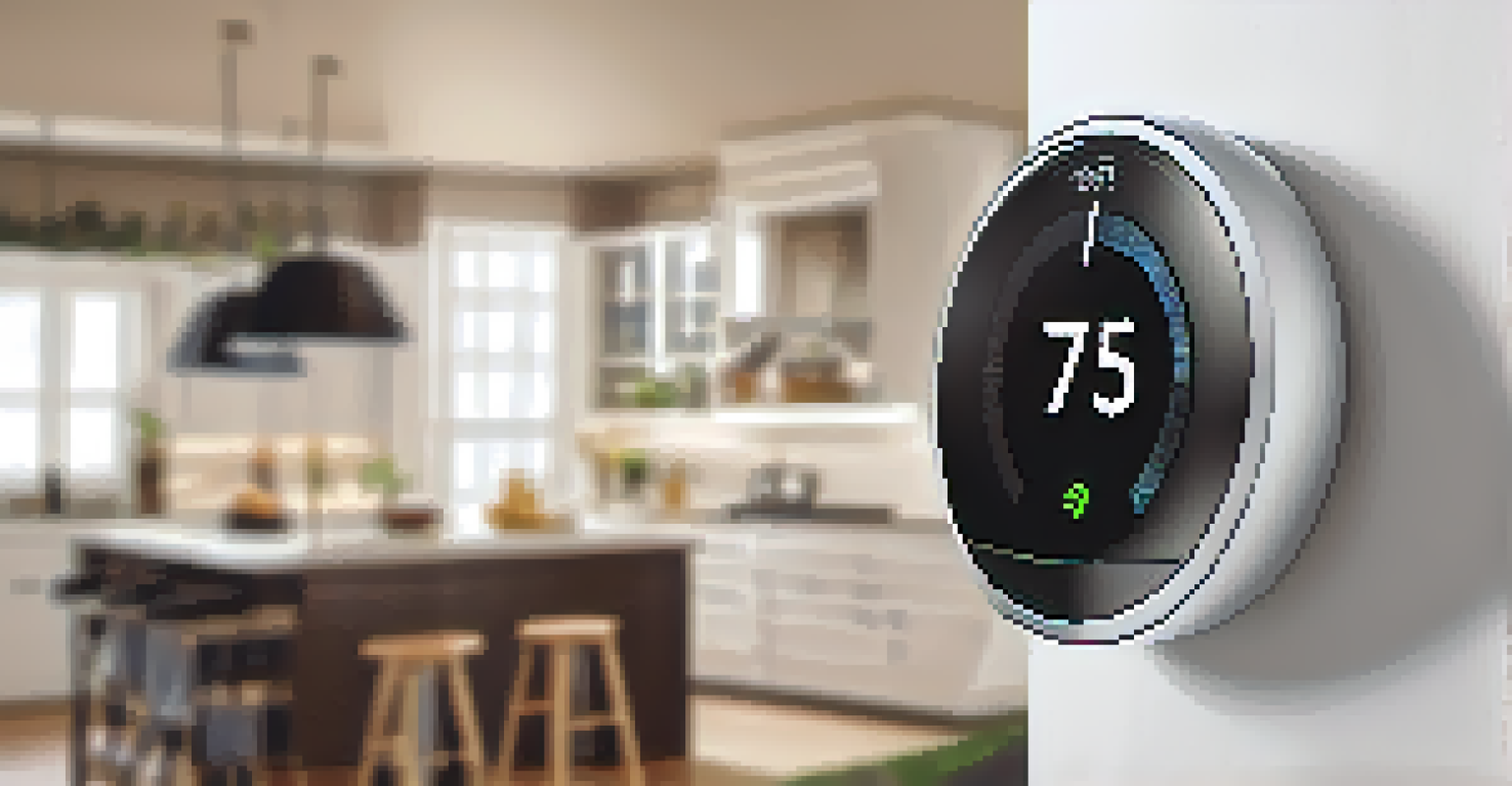Leveraging Technology for Energy-Efficient Home Systems

Understanding Energy Efficiency in Modern Homes
Energy efficiency refers to using less energy to provide the same service, such as heating, cooling, or lighting. This concept is crucial in modern homes as it not only reduces utility bills but also minimizes environmental impact. With rising energy costs and increasing awareness of climate change, homeowners are more motivated than ever to make their homes energy efficient.
Energy efficiency is not just about saving money. It’s about creating a better world for future generations.
But what does this really mean for the average homeowner? Simply put, it involves integrating various technologies and systems that optimize energy use without sacrificing comfort. For instance, energy-efficient appliances can significantly lower your energy consumption, making a big difference over time.
Moreover, understanding energy efficiency can empower homeowners to make informed decisions when upgrading or renovating their spaces. By prioritizing energy-efficient options, you can create a more sustainable home that contributes positively to the planet.
Smart Home Technology: The Future of Energy Management
Smart home technology has revolutionized how we manage energy in our homes. Devices like smart thermostats, which learn your habits and adjust heating or cooling accordingly, can lead to significant energy savings. This technology not only optimizes energy use but also enhances convenience and comfort.

Imagine coming home to a perfectly cooled house after a long day, all while knowing that your smart thermostat has adjusted the temperature during the day to save energy. This seamless integration of technology makes energy management effortless. Moreover, many smart devices can be controlled remotely, allowing homeowners to monitor and adjust their energy consumption from anywhere.
Embrace Energy Efficiency Today
Energy efficiency reduces costs and environmental impact by optimizing energy use in homes.
By investing in smart home technology, homeowners can take a proactive approach to energy efficiency. These systems not only help in reducing energy bills but also provide valuable insights into energy usage patterns, allowing for further optimization.
Renewable Energy Sources: Powering Your Home Sustainably
Incorporating renewable energy sources such as solar panels into your home is an excellent way to improve energy efficiency. These systems harness natural energy from the sun, reducing reliance on fossil fuels and lowering your electricity bills. With declining costs and increasing efficiency, solar energy has become more accessible to homeowners.
The best way to predict the future is to create it.
For instance, a solar panel system can generate enough electricity to cover a significant portion of your home’s energy needs. In many cases, homeowners can even sell excess energy back to the grid, creating an additional stream of income. Plus, the environmental benefits of using clean energy are immeasurable, contributing to a reduction in carbon footprint.
Transitioning to renewable energy not only helps in saving money but also supports a sustainable future. By choosing to harness the power of the sun, you’re making a positive impact on the planet while enjoying the benefits of lower energy costs.
Energy-Efficient Appliances: A Smart Investment
Investing in energy-efficient appliances is one of the most straightforward ways to enhance your home's energy efficiency. These appliances are designed to use less energy while delivering the same performance as their traditional counterparts. For example, ENERGY STAR-rated refrigerators consume significantly less electricity than older models.
By replacing outdated appliances with energy-efficient ones, homeowners can see immediate reductions in their energy consumption. This not only leads to savings on utility bills but also extends the lifespan of appliances since they often come with better technology and warranties. It’s a win-win situation that benefits both your wallet and the environment.
Smart Tech for Energy Savings
Smart home technology, like thermostats and lighting, enhances convenience while lowering energy bills.
Moreover, many utility companies offer rebates or incentives for upgrading to energy-efficient appliances, making it an even more attractive option. In this way, you can invest in your home while also contributing to a more sustainable future.
Home Insulation: Keeping Your Energy Costs Low
Proper insulation is crucial for maintaining a comfortable home and is a key component of energy efficiency. Insulation works by creating a barrier that prevents energy loss, helping to keep your home warm in the winter and cool in the summer. This means you can rely less on heating and cooling systems, leading to lower energy bills.
Imagine a well-insulated home as a thermos bottle; it keeps hot liquids hot and cold liquids cold. Similarly, good insulation helps maintain your home's temperature, reducing the strain on HVAC systems. This not only saves energy but also extends the life of your heating and cooling equipment.
Upgrading insulation can be a cost-effective way to enhance energy efficiency. Whether it’s adding insulation to your attic, walls, or floors, this improvement can pay off in energy savings and increased comfort over time.
Smart Lighting Solutions: Brightening Your Home Efficiently
Lighting is another area where technology can significantly improve energy efficiency. Smart lighting systems allow homeowners to control their lights remotely and set schedules, ensuring lights are only on when needed. This can lead to considerable savings, especially in large homes with multiple rooms.
LED bulbs, for example, use up to 80% less energy than traditional incandescent bulbs and last much longer. By switching to LED lighting, homeowners can drastically reduce their energy consumption without sacrificing brightness or quality.
Invest in Renewable Energy
Incorporating renewable energy sources, such as solar panels, can significantly decrease reliance on fossil fuels and save on electricity costs.
Additionally, smart lighting can enhance security by allowing lights to be programmed to turn on and off at specific times. This not only saves energy but also provides peace of mind when you’re away from home.
Energy Monitoring: Understanding Your Usage Better
Energy monitoring systems provide valuable insights into how and where energy is being used in your home. By tracking energy consumption in real-time, homeowners can identify high-energy appliances and make informed decisions about their usage. This awareness is key to optimizing energy efficiency.
For example, if you discover that your washing machine is one of your biggest energy users, you might choose to run it during off-peak hours or invest in a more efficient model. Understanding your energy patterns empowers you to take control of your consumption and make adjustments.

Moreover, many energy monitoring systems can send alerts when usage spikes or when appliances are left on, preventing unnecessary energy waste. This proactive approach not only helps save money but also fosters a more sustainable lifestyle.